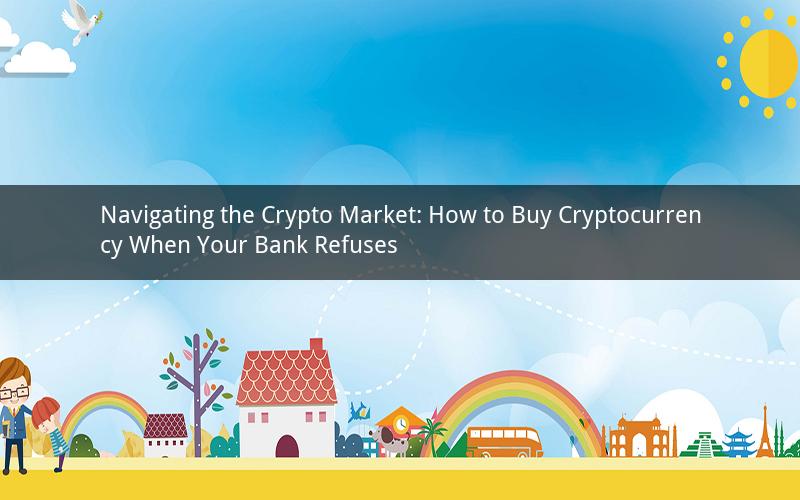
Introduction:
In the rapidly evolving world of digital currencies, purchasing cryptocurrencies has become a popular investment choice. However, many individuals face the challenge of being unable to buy crypto through their traditional banking channels. This article explores alternative methods and strategies to buy cryptocurrency when your bank is unwilling to facilitate the transaction.
1. Understanding the Issue:
When your bank refuses to let you buy cryptocurrency, it is usually due to regulatory concerns or internal policies. Banks may have restrictions on dealing with digital assets due to their volatile nature or potential for fraud. Understanding the reasons behind your bank's refusal is crucial in finding an alternative solution.
2. Researching Alternative Payment Methods:
If your bank is unwilling to assist you in purchasing cryptocurrency, it is essential to explore alternative payment methods. Here are some popular options:
a. Cryptocurrency Exchanges: Many cryptocurrency exchanges accept various payment methods, including credit/debit cards, bank transfers, and even cash deposits. Research and choose a reputable exchange that offers the payment method you prefer.
b. Peer-to-Peer Platforms: Platforms like LocalBitcoins allow you to buy cryptocurrency directly from other individuals. This method often involves cash transactions or bank transfers. Ensure you exercise caution and conduct thorough research before engaging in any peer-to-peer transactions.
c. Cryptocurrency ATMs: Cryptocurrency ATMs provide a convenient way to buy crypto using cash or credit/debit cards. These ATMs are widely available in many cities and towns. However, be aware of the fees associated with using these ATMs.
3. Setting Up a Cryptocurrency Wallet:
Before purchasing cryptocurrency, it is crucial to have a secure wallet to store your digital assets. Here are some popular wallet options:
a. Hardware Wallets: Hardware wallets offer the highest level of security by storing your cryptocurrency offline. They are considered the safest option, but they come with a higher price tag.
b. Software Wallets: Software wallets are available as mobile apps or desktop applications. They are more accessible and cost-effective but are susceptible to hacking and malware attacks.
c. Web Wallets: Web wallets are online services that allow you to access your cryptocurrency from any device with an internet connection. While convenient, they are less secure than hardware wallets.
4. Verifying Your Identity:
When purchasing cryptocurrency, you may encounter strict Know Your Customer (KYC) requirements. This process involves verifying your identity to comply with anti-money laundering (AML) regulations. Be prepared to provide identification documents such as a government-issued ID, proof of address, and possibly a photo.
5. Choosing the Right Cryptocurrency:
With numerous cryptocurrencies available, it is essential to research and select the right one for your investment goals. Consider factors such as market capitalization, liquidity, and potential for growth. Popular cryptocurrencies include Bitcoin, Ethereum, Litecoin, and Ripple.
6. Monitoring the Market:
Once you have purchased cryptocurrency, it is crucial to stay informed about market trends and developments. Keep an eye on news, social media, and analysis from reputable sources. This will help you make informed decisions regarding buying, selling, or holding your digital assets.
7. Staying Secure:
Security is a top priority when dealing with cryptocurrencies. Here are some tips to ensure your assets remain safe:
a. Use Strong Passwords: Create strong, unique passwords for your wallets and exchanges.
b. Enable Two-Factor Authentication (2FA): Activate 2FA on your wallets and exchanges for an extra layer of security.
c. Be Wary of Phishing Attempts: Be cautious of emails, messages, or calls asking for your private keys or personal information.
8. Conclusion:
Buying cryptocurrency when your bank refuses to assist can be challenging, but it is not impossible. By researching alternative payment methods, setting up a secure wallet, verifying your identity, and staying informed about the market, you can successfully navigate the crypto market. Remember to prioritize security and exercise caution when engaging in any cryptocurrency transactions.
Questions and Answers:
1. Q: Can I buy cryptocurrency with a credit card if my bank refuses to facilitate the transaction?
A: Yes, you can buy cryptocurrency using a credit card through reputable cryptocurrency exchanges or peer-to-peer platforms. However, be aware of the potential fees and interest charges associated with using a credit card for cryptocurrency purchases.
2. Q: Is it safe to use peer-to-peer platforms for buying cryptocurrency?
A: While peer-to-peer platforms can be a convenient way to buy cryptocurrency, they come with inherent risks. Conduct thorough research, exercise caution, and consider using escrow services to ensure a secure transaction.
3. Q: Can I use a web wallet to store my cryptocurrency?
A: Yes, web wallets are a convenient option for accessing your cryptocurrency from any device with an internet connection. However, they are less secure than hardware wallets and are susceptible to hacking and malware attacks.
4. Q: What should I do if I lose my private key for my cryptocurrency wallet?
A: Losing your private key means losing access to your cryptocurrency. It is crucial to have a backup of your private key and follow best practices for wallet security to prevent this situation. If you lose your private key, you may need to contact the wallet provider for assistance.
5. Q: Is it necessary to verify my identity when buying cryptocurrency?
A: Yes, most reputable cryptocurrency exchanges and platforms require you to verify your identity to comply with KYC and AML regulations. This process helps prevent fraud and money laundering activities.